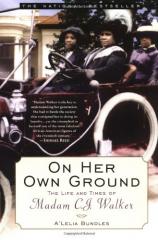Reading Group Guide
Discussion Questions
On Her Own Ground: The Life and Times of Madam C.J. Walker

1. Very few documented details survive from Madam Walker's childhood as Sarah Breedlove. From her own words, we know that she was born in 1867 on the plantation where her parents had been slaves, that she was orphaned at 7, married at 14, a mother at 17 and a widow at 20. What events and people from her early life influenced her and planted the seeds for her later success? Because On Her Own Ground is a nonfiction book, the author cannot fictionalize details she does not know or fabricate conversations which never occurred. How does she compensate for the lack of documentation?
2. Madam Walker's daughter, Lelia (later known as A'Lelia Walker), provided much of her early motivation to improve her life. As Lelia grew older their relationship was complicated. In fact Madam Walker's secretary once said the relationship was "like fire and ice. They loved each other dearly and they sometimes fought fiercely." Yet, they were so enmeshed and emotionally connected that they were never fully estranged. The themes of loss and abandonment run through the lives of both women. Sarah's parents died before she really could know them. Lelia never really knew her father. Was Sarah overly protective? Did she spoil Lelia? How do you think John Davis's behavior affected their relationship? Why might it be that Lelia didn't seem to have the same level of ambition and drive as her mother?
3. What was the influence of the women of the AME Church, the NACW and the Court of Calanthe on Sarah? How did she use some of the networking skills she learned from these groups to organize her own sales agents and beauty culturists?
4. Many people focus on Madam Walker's role as a pioneer in the hair care industry. Her entrepreneurial contributions were important, but she seemed to have a vision for women that included economic independence and political action. Are there themes and initiatives that she raised at the 1917 and 1918 Walker agents convention and in other speeches that are relevant today?
5. Madam Walker wanted Booker T. Washington's endorsement though he was not receptive at first. Why did he shun her? How did she win him over? What do you think she felt when he resisted her efforts to speak at his 1912 National Negro Business League conference?
6. Madam Walker was one of the wealthiest self-made businesswomen of her era, but what made her truly great and unique was her philanthropy and political activism. Are there examples of women or African American entrepreneurs today who exhibit the same social consciousness? Why might such an approach be important?
7. What are some examples of Madam Walker's philanthropy?
8. Madam Walker tried to hide the existence of her second marriage to John Davis. Why do you think she did that? Why do you think she had so much difficulty in her marriages?
9. For many years many people believed the myth that Madam Walker invented the hot comb and that her primary objective was to straighten black women's hair. Now that you know this information is incorrect, what particular hygiene issue was she trying to address? Also, she was very aware of the controversy about whether black women should straighten their hair or maintain a more natural look. She once said, "Let me correct the erroneous impression that I claim to straighten hair. I deplore such impression because I have always held myself out as a hair culturist. I grow hair. I have absolute faith in my mission. I want the great masses of my people to take a greater pride in their appearance and to give their hair proper attention. I dare say that in the next ten years it will be a rare thing to see a kinky head of hair and it will not be straight either." What do you think she meant in the final sentence?
10. If your city is included in the book -- either as a place where Madam Walker lived or visited -- discuss what the community may have been like a century ago as African Americans and women tried to develop businesses and political organizations. Are there current reminders in your community of that history?
11. What were A'Lelia Walker's contributions to the Walker Company and to the Harlem Renaissance?
12. What is the current impact of Madam Walker's life? Does she still serve as an inspirational figure for women and people of color? What is her larger legacy to the business community?
On Her Own Ground: The Life and Times of Madam C.J. Walker
- Publication Date: January 2, 2002
- Paperback: 416 pages
- Publisher: Scribner
- ISBN-10: 0743431723
- ISBN-13: 9780743431729







